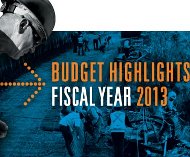2/17/2012
White House Doubles Spending on Mass TransitPresident proposes to double the money spent on trains, trolleys and subways.

The White House on Monday released its budget for federal transportation spending in 2013. In sharp contrast to the plan proposed by Republicans in the US House of Representatives, the administration wants to encourage the diversion of federal gasoline tax dollars into mass transit programs by doubling funding over the next six years.
"Look, investing in transit is more than just a question of what we spend; it's a question of what we value," Transportation Secretary Ray LaHood wrote on his FastLane blog Tuesday. "It's a question of fairness for our friends and neighbors who can't drive or can't afford to own a car."
The document cites a "peace dividend" from ramping down overseas military operations as an offset to boost spending on favored initiatives. For example, the proposal would spend $47 billion over six years on high-speed rail and Amtrak subsidies. The budget expends $2.2 billion on 29 rail and bus projects in fifteen states.
As part of a program to make "livable and sustainable communities," $108 billion in gas tax funds would be spent on subways and buses over six years -- double the amount previously authorized. Another $20 billion would be set aside to encourage states to set up "livability" projects as well as various programs to encourage the issuance of traffic tickets.
Like the House plan, the president's budget contains no earmarks and would consolidate duplicative grant programs. Overall transportation spending in 2013 would rise 4.8 percent to $74,334,000,000, but even the money dedicated toward "highways" would be spent on transit. The Federal Highway Administration will spend $4 billion on "livable communities." Missoula, Montana, for example, used these grants to build 400 miles of pedestrian facilities and bicycle paths.
"President Obama's 2013 budget will support the research and technologies that America's next generations will need to sustain a thriving economy," LaHood wrote. "As we rebuild, we can no longer afford to continue operating our transportation systems the same way we did 50 years ago, with outdated processes and financial tools that were made for yesterday's economy."


